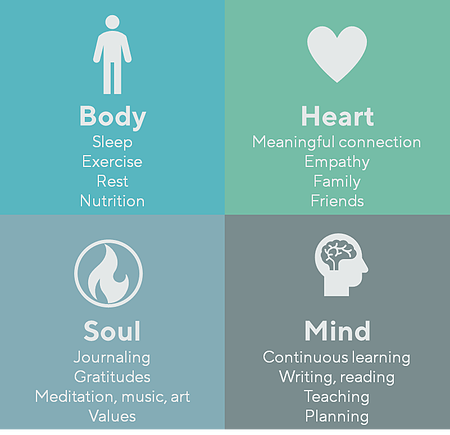This article is the first in a three-part series about the importance of re-charging. It’s about keeping a healthy balance in all aspects of your life: body, mind, heart and spirit.

Free up at least an hour every single day to re-set. Take time to exercise and do stretching (body), learn something new (mind), make meaningful connections with friends and family (heart), and do some meditation, yoga or journaling (spirit). This practice is not complex but it is hard. You need the discipline to do a little bit every day. It’s hard because you have to be proactive and plan this time rather than just be reactive to the urgent and pressing events that unfold around you.
During the day it’s also important to take regular short breaks. This helps to prevent decision fatigue and gives your mind a well-earned break, allowing passive problem solving to occur.
Re-charging is also a critical part of stress release, facilitates clear-thinking, and is a pre-condition to cognitive flow.
What is re-charging?
The American Indians have the concept of a medicine wheel, like a compass with four points: heart, body, mind and soul. A healthy productive life requires all four dimensions to be balanced. All four aspects are inextricably linked.

Body
This is the physical aspect and is about caring for your body including regular exercise (cardio, strength and flexibility), eating well, rest and getting a peaceful night sleep.
Exercise: Regular exercise offers great benefits not only for your body but also your mind.
Researchers from Tufts University have documented the effect of regular exercise on many of the biomarkers of aging, such as aerobic capability, bone density, strength, muscle mass, and cholesterol.[1]
Many people find that if they exercise first thing in the morning it helps them to wake up and get going. There is a psychological benefit of exercising first. It is a small victory of your willpower and means you have “paid yourself first” before the rest of the day is hi-jacked by work.
Not only is exercise invigorating, but the activity will trigger the release of adrenaline and other stimulating hormones, which sharpen your focus and speed up your metabolism. Have you ever noticed after going for a walk, jog, bike ride or doing a session at the gym, that you feel energised? These hormones tend to have lasting effects and will keep you energised for several hours.
There is also research showing that physical activity triggers biological changes that enhance the brain’s ability to adapt, learn, and execute cognitive tasks. Exercise can also reverse the negative effects of stress and reduce depression.[2] In other words, not only does doing regular exercise reduce the aging effect in your body, but promotes emotional wellbeing and keeps your mind vital.
You are more likely to exercise if it involves something you enjoy. If you dislike running, then don’t do it. Find something fun like boxing classes or tennis or sign up with a personal trainer. Your fitness program should include stretching for flexibility (particularly if you spend a lot of time sitting at a desk), some cardio training (like cycling, running, walking or boxing) and strength workouts (like weights or bodyweight exercises like pushups or dips).
You wouldn’t be surprised to learn that 76% of successful people exercise aerobically several times a week.[3]
Food: Many people under-estimate the effect food has on their wellbeing, energy levels and mental clarity. Eat the wrong foods (processed foods, excess alcohol, sugar) and you’ll feel tired, foggy and sluggish. Eat real, whole foods (a balanced diet of unprocessed foods rich in micro-nutrients, plenty of vegetables, protein, fruit) and you will have new energy and focus. If you are subsisting on a diet of soda, take-away, cookies and ice-cream your performance will be sub-optimal.
Sleep: Without proper sleep your brain becomes sluggish and your decision-making is impaired.
Researchers at the University of Rochester Medical Center looked at how waste in your brain is removed.[4] Your body uses the lymphatic system to remove waste from your body (such as microbes and other cellular debris). Your brain however doesn’t have a lymphatic system. Using photon imaging to trace the movements of fluorescent markers in the brain of a mouse, they discovered hydraulic vessels that carry cerebro-spinal fluid around the brain, picking up waste on its way.
They discovered that proper function of these vessels depends on movement of sufficient water around the brain. They also discovered that inter-cellular spaces expand by up to 60% in the brains of naturally sleeping and anaesthetised mice, and that this expansion drives the clearance of waste from the brain by facilitating the movements of water.
Researchers have found links between lack of sleep and diabetes, increased blood pressure, anxiety and heart disease. According to a study published by the American Psychological Association, sleep has been proven to be the key factor in predicting longevity.
Adults need at least six and preferably eight hours of sleep each night. More importantly, it needs to be restful sleep, which is when you sleep soundly through the night and wake up revitalised and energetic. If you need alcohol or pharmaceuticals to go to sleep, chances are you are not getting restful sleep.
You need to develop good sleep rituals. Some tips for getting more sleep:
-
Buy a good quality mattress and change it over every 5 years or so.
-
Read a book (a real book not on a screen).
-
Avoid screen time one hour before bed. No phones, no TV, no computers or iPads. Read instead.
-
Try taking magnesium in the evening.
-
Try a hot shower just before bed.
-
Make sure your room is dark (switch off anything with blinking lights and draw the blinds).
-
Avoid caffeine in the afternoon.
-
Try going to bed and waking up at the same time every day.
-
Get a good quality pillow.
-
Keep a note of things which keep you awake at night (for some people garlic, bread, wine or spiced food can cause heart burn or bloating).
Heart
Heart is the emotional and social aspects of your life. This is about making meaningful connections with others. It is about quality time with friends, family, colleagues.
A strong social network keeps you from feeling isolated or lonely. Friends and family can be a great source of support when you are going through stressful situations and can give you valuable advice for dealing with conflicts. Spending time with friends can also be a good distraction from whatever has been troubling you.[5]
Another important step for emotional balance is to let go of grudges or other emotional toxins. It is easy to harbour grudges and hold onto unprocessed disappointment, anger, and jealousy. You should think of these unresolved issues as a toxin that you need to release or eliminate.
Spend some time journaling. Ask yourself what have you been holding onto from the past that is no longer serving you now. Then take a moment to write about how life will be different if you were able to let go of that thing.[6]
Mind
Mind is about the mental aspect of your life including writing, reading and teaching. This is about lifelong learning. Keeping your mind challenged, curious, and growing.
Many people cease to study once they have finished school or university. Their minds begin to atrophy. They lose a sense of curiosity. They don’t read about important issues. They don’t explore new topics outside their immediate field of work.
Learn about a completely new area from your normal work: science, psychology, economics, history. Rather than skimming through news, social media or celebrity news, why not read a book, watch a TED talk or listen to a podcast. Instead of watching television every night, try a history documentary or sign up for an evening course on politics, sociology or a foreign language.
Studies have shown that people who frequently read fiction are more empathetic and understand other people better.[7]
Soul
Soul covers the spiritual aspects of your life such as meditation, yoga, music and prayer.
This aspect relates to finding your purpose, your centre, and also includes discovery and adherence to your own value system (such as integrity, fairness, openness and service).
If you are motivated by the wrong drivers (money, status or fame) then you will find that happiness is elusive and the spiritual aspects of your life are out of balance. If you are only thinking about yourself, then your work will also suffer. Clarity and creativity are enhanced significantly once you devote your work to helping others and providing service. In turn you will find better balance.
Reading a great book or listening to music can be spiritually uplifting as well. Immerse yourself in the activity and don’t be distracted.
Some people find that spending time in nature (like hiking or surfing) re-sets them. Getting away from the stress and hustle of the city is uplifting. If you really unplug (leave your phone and iPad at home) and enjoy the experience it will help to clear your mind of stress and give you new energy.
A study by Massachusetts General Hospital found that meditating for as little as eight weeks can help people feel calmer and produced brain changes linked to empathy, stress regulation and enhanced memory.[8]
Prayer is another facet of keeping balance from a spiritual perspective. Martin Luther King once said “I have so much to do today, I’ll need to spend another hour on my knees.” To him prayer was a way to build his energy and not a mechanical duty.[9]
The Woodcutter
There is a simple parable about a woodcutter. A boy is walking in the woods and comes across a woodcutter, working busily to cut down a tree.
“Hello, what are you doing?” asked the boy.
“Can’t you see,” says the woodcutter tersely. “I am sawing down this tree.”
“You look tired,” the boy says. “How long have you been sawing?”
“Four hours! I am exhausted,” says the woodcutter.
“Maybe you should take a break and sharpen that saw,” says the boy. “I am sure it will cut much faster after it has been sharpened.”
“I am too busy cutting down this tree to sharpen my saw,” replies the woodcutter exasperatedly.[10]
“If I had five minutes to cut down a tree, I would spend the first three minutes sharpening my axe.”
– Abraham Lincoln
Stay tuned for part two of the series, which discusses why re-charging is so important.
About the author
Nick Humphrey is the managing partner of Hamilton Locke. He is the Chairman of the Australian Growth Company Awards and author of a number of best-selling books on business and leadership. His latest book is Maverick Executive: strategies for Driving Clarity, Effectiveness and Focus, published by Wolters Kluwer.
Sources
[1] Chopra Center, “7 tips for mind-body balance,” http://www.chopra.com/ccl/7-tips-for-mind-body-balance
[2] Chopra Center, “7 tips for mind-body balance,” http://www.chopra.com/ccl/7-tips-for-mind-body-balance
[3] Thomas Corley, “Rich Habits: The daily success habits of wealthy individuals”.
[4] Mo Costandi, “How to optimise your brain’s waste disposal system,” 22 August 2015, The Guardian, https://www.theguardian.com/science/neurophilosophy/2015/aug/22/how-to-optimise-your-brains-waste-disposal-system
[5] Chopra Center, “7 tips for mind-body balance,” http://www.chopra.com/ccl/7-tips-for-mind-body-balance
[6] Chopra Center, “7 tips for mind-body balance,” http://www.chopra.com/ccl/7-tips-for-mind-body-balance
[7] Courtney Seiter, “The science of taking breaks at work: how to be more productive by changing the way you think of downtime,” Buffer Open, 21 August 2014, https://open.buffer.com/science-taking-breaks-at-work/
[8] Chopra Center, “7 tips for mind-body balance,” http://www.chopra.com/ccl/7-tips-for-mind-body-balance
[9] Stephen R. Covey, “The seven habits of highly effective people,” The Business Library, 1989 p 294
[10] Covey p.287